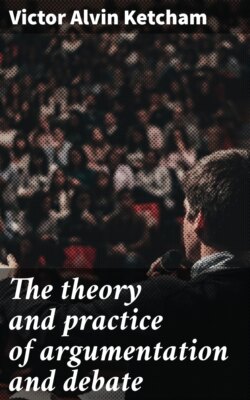Читать книгу The theory and practice of argumentation and debate - Victor Alvin Ketcham - Страница 52
На сайте Литреса книга снята с продажи.
3. Evidence should be examined to determine whether there are attendant circumstances which will add to its weight.
ОглавлениеIt often happens that evidence which is good in itself is given still greater weight by some special circumstances. The law recognizes and gives much weight to “Declarations against Interest,” and such declarations are as valuable in argumentation as in law. A declaration against interest is a statement of fact or opinion made by a party before the subject became a matter of controversy, which statement is now against the interest of the person making it. To illustrate, let us suppose that John D. Rockefeller had made a statement opposing the formation of monopolies. At present he wishes to argue in favor of monopolies. The statement which he previously made and which was an expression against monopolies now becomes a “declaration against interest.” Likewise any statement made in regard to a subject before the party making it becomes interested therein financially may be used against him when the matter becomes one of controversy and he wishes to take a different position.
Of equal value is the opinion frankly expressed, by one whose personal interests are opposed to the statement made. Such statements are sometimes made by public spirited men in the interests of right and justice. An illustration in point is that of the banker who admitted that the postal savings bank would be a benefit to the people at large, although he recognized the fact that it would injure the business of the private banker, a class to which he himself belonged. Such statements are of the utmost importance when they come from leading members of the class against which they constitute admissions. Statements made by persons who express their views in accordance with what appears to them to be right and without the knowledge that they are talking against their own interests may likewise be used as admissions. Such were the statements of a citizen who favored the building of an elevated railroad in his city. He believed that such a highway would relieve the congested condition of the streets and thus benefit the public. When the route for the proposed road was definitely located he found that it would result in irreparable damage to his private business. Although he at once changed his view on the subject, his previous admissions were used against him with such effect that his new arguments had no weight in the final determination of the matter.
It very often happens that a well known authority frequently used by the opponents of a proposition has changed his opinions or expressed himself more definitely in such a way as to favor the speaker’s contentions. Advantage should always be taken of such a state of affairs. It is a most strategic move to be able to quote an opponent’s authority against him. One should be sure, however, that the authority quoted is such as will be accepted. Otherwise it is better to attack the validity of this authority.
The above suggestions and illustrations are offered purely by way of inducing the student to keep a sharp lookout for points in his favor. There are many ways in which the attendant circumstances may be used to give greater weight to the evidence offered.
